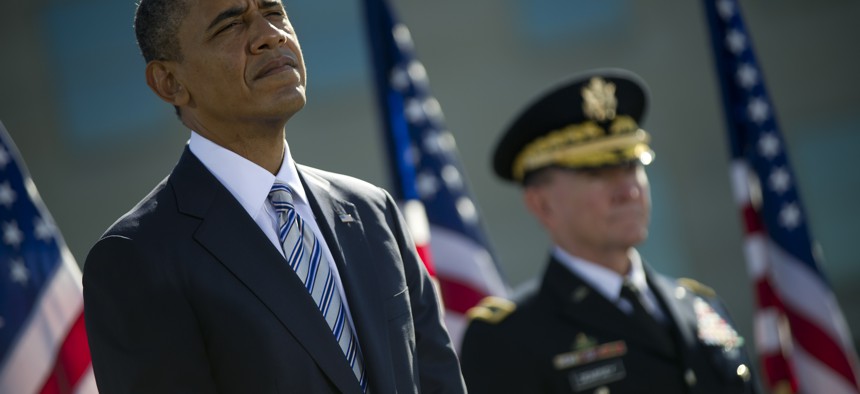
Flickr user Chuck Hagel (Creative Commons)
U.S. Foreign Policy Too Reliant on Military, Say National Security Officials
Despite a worsening international security environment, national security officials surveyed say U.S. foreign policy relies too heavily on the military.
Today’s international security environment may be more dangerous than in the recent past, but that doesn’t mean the military has a greater role to play in the making of U.S. foreign policy. In fact, Government Business Council and Defense One’s recent survey* of national security officials reveals that many within government believe that the military already plays an outsized role in this process.
In the wake of Russian aggression in Ukraine, the rise of the Islamic State, increasing tensions in the South China Sea, and more, it is no surprise that 77 percent of the survey’s respondents believe today’s international security environment is more dangerous for the U.S. than it was in 2008.

Perhaps what is surprising is that, within this context, 50 percent of national security officials surveyed think the U.S. relies too heavily on its military to achieve its foreign policy goals.

This figure holds true when we remove respondents from the Departments of State and Homeland Security from the sample and only look at active-duty military and Department of Defense civilian respondents (84 percent of the survey sample). Even within the defense community, the sense that U.S. foreign policy has become too reliant on its military appears to be widespread.
So what accounts for this acute self-consciousness? One possible explanation is that the military has had a difficult time identifying lasting successes in its recent interventions abroad. Less than one quarter of the national security officials GBC and Defense One surveyed agree that the war in Iraq was worth its cost, and a recent Military Times survey found that just 23 percent of troops think the U.S. is likely to succeed in Afghanistan.

“U.S. military action cannot be the only -- or even primary -- component of our leadership in every instance,” President Obama said in May 2014. “Just because we have the best hammer does not mean that every problem is a nail.” GBC and Defense One’s survey findings suggest that the hammer, in large part, agrees.
-------------
For more insights from the survey, take a look at these posts from GBC and Defense One:
“Multilateral or Unilateral Intervention? National Security Workers Have No Preference”
“Political Dysfunction is a Worse Threat Than Putin, Say National Security Workers”
“National Security Professionals Pick Mitt Romney in 2016 Poll”
“Hagel Approval Rating Just 26 Percent Among National Security Workers, Troops”
*Defense One and GBC, divisions of Atlantic Media’s Government Executive Media Group, sent an email-based survey to a random sample of Government Executive, Nextgov, and Defense One subscribers. Of those, 427 respondents from the Departments of Defense, Homeland Security, and State completed the survey, including those at the GS/GM-11 to 15 grade levels, active duty military personnel, and members of the Senior Executive Service; 55 percent of respondents are GS/GM-13 and above or the military equivalent; 77 percent are DOD civilians; 7 percent are active duty military personnel. The results have been weighted by service branch and agency. The margin of error is +/- 4.74 percent.
This post is written by Government Business Council; it is not written by and does not necessarily reflect the views of Government Executive Media Group's editorial staff. For more information, see our advertising guidelines.



